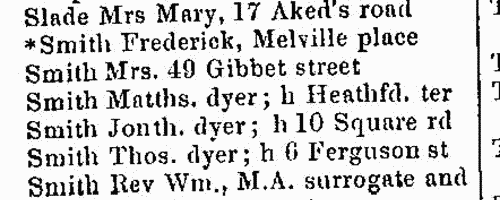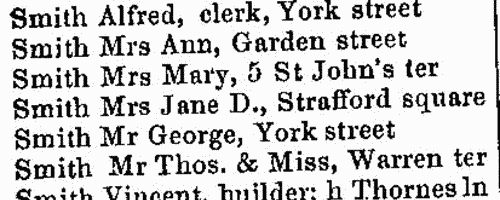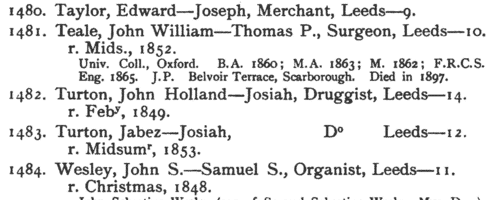Our indexes include entries for the spelling idle. In the period you have requested, we have the following 123 records (displaying 81 to 90):
Traders and professionals in London
(1851)
The Post Office London Directory for 1851 includes this 'Commercial and Professional Directory', recording about 80,000 individuals. | Sample scan, click to enlarge

|
Inhabitants of Dewsbury, Yorkshire
(1853)
William White's directory lists traders, farmers and private residents in the area. | Sample scan, click to enlarge

|
Inhabitants of Halifax, Yorkshire
(1853)
William White's directory lists traders, farmers and private residents in the area. | Sample scan, click to enlarge

|
Inhabitants of Leeds, Yorkshire
(1853)
William White's directory lists traders, farmers and private residents in the area. | Sample scan, click to enlarge

|
Inhabitants of Wakefield, Yorkshire
(1853)
William White's directory lists traders, farmers and private residents in the area. | Sample scan, click to enlarge

|
Bankrupts' Assignments
(1856)
Assignments of bankrupts' estates (usually to principal creditors and/or close relatives of the bankrupt) in England and Wales | Sample scan, click to enlarge

|
Boys at Leeds Grammar School
(1856)
The admission books for Leeds Grammar School from 1820 to 1900 were edited by Edmund Wilson and published in 1906. The series of registers is almost complete for the period, there being in addition admission registers for the Lower (or Commercial) Department from 1856 to 1865, and lists of boys in the school in 1856, and in the Commercial Department in 1861. The entries are arranged by date or term of admission: a sequential number is given first, then surname, christian name, and, after a dash, father's christian name, occupation, and address; another dash, and then the age of the boy at admission, and often his year of leaving (with the abbreviation r. for 'removed' or 'left'). r.* means left without notice; (o) or S. or Stranger or Foreigner indicates a boy not on the foundation. The editor was unable to divine the meaning of the abbreviation (Q) or the asterisks prefixed to most entries in 1856 to 1860, but dutifully copies them into the text. In smaller type he then proceeds, where possible, to add some information about the boy's subsequent career. | Sample scan, click to enlarge

|
Gentry in London
(1856)
The Post Office London Directory for 1856 includes this 'Court Directory', listing alphabetically by surname and christian name the upper class residents of the capital with their postal addresses. 'In order to afford space for the addresses, the abbreviation "esq." for esquire has no longer been appended to each name in the Court Directory. It should be understood that such should be added to the name of every gentleman in the following pages to which no inconsistent addition is affixed.' Decorations, honours &c. are generally given. Some gentlemen appear who are also listed (as professional men, &c.) in the commercial section. Those with second residences in the provinces usually have the country address given as well. | Sample scan, click to enlarge

|
Insolvents
(1856)
Insolvency notices for England and Wales: insolvency often caused people to restart their lives elsewhere, so these are an important source for lost links | Sample scan, click to enlarge

|
Traders and professionals in London
(1856)
The Post Office London Directory for 1856 includes this 'Commercial and Professional Directory', recording over 100,000 individuals. | Sample scan, click to enlarge

|
Research your ancestry, family history, genealogy and one-name study by direct access to original records and archives indexed by surname.











